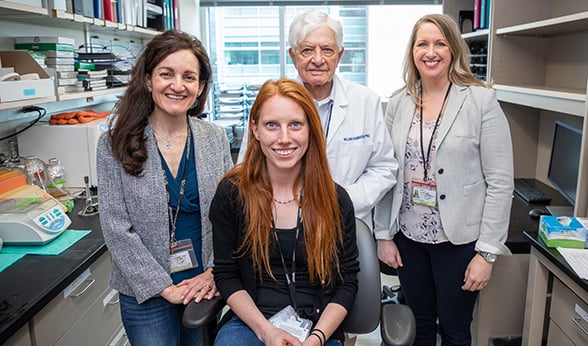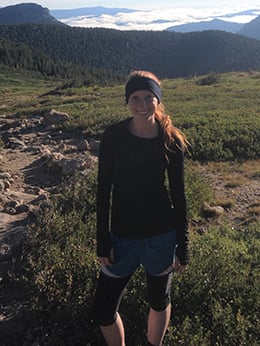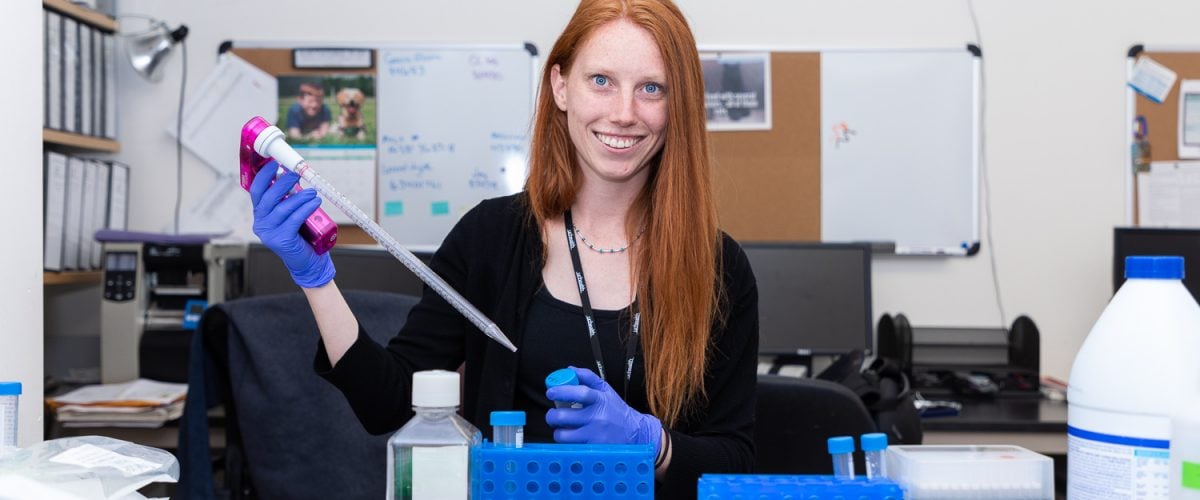The CU Anschutz Medical Campus conducts cutting-edge research that is advancing personalized medicine and making other important discoveries. Typically, the work is done by scientists whose credentials include a PhD and often other advanced degrees.
And then there is Jaqueline Turner.
Turner is already doing bench-to-bedside research, which is extending the lives of stage IV melanoma patients, as a first-year MD/PhD student in the Medical Scientist Training Program at the CU School of Medicine.

Jacqueline Turner with some of her mentors at CU Anschutz: from left, Isabel Schlaepfer, PhD; William Robinson, MD, PhD; and Kasey Couts, PhD.
Turner was selected as one of only 11 recipients of the prestigious Hertz Foundation Fellowship from a pool of more than 840 applicants. She is the first-ever CU Anschutz awardee; three students from CU Boulder have won Hertz Fellowships, with the last recipient being 15 years ago.
Highly prized award
“I honestly didn’t think it was going to happen,” said Turner, who received a bachelor’s degree in biochemistry and integrative physiology at CU Boulder in 2017. “Historically, they fund a lot of engineers and students in the physical sciences. I’m not an engineer. As I learned more about the fellowship, they are interested in people in a variety of disciplines – people who are very creative, curious and innovative.”
As part of the extremely prized award, Turner will receive about $250,000 in support toward her graduate-school ambitions, which include a PhD, with a particular interest in molecular oncology. Her program, the National Institutes of Health-funded MSTP, supports medical students seeking dual MD and PhD degrees.
Key mentors
Turner’s interest in research began in the cardiac laboratory of Russell Moore, PhD, in the Integrative Physiology Department at CU Boulder. As an undergraduate, she joined the Robinson Melanoma Research Laboratory at CU Anschutz, working alongside William Robinson, MD, PhD, a world-renowned melanoma expert, and Kasey Couts, PhD.

When she's not in class or in the lab, Jacqueline Turner enjoys exploring the Colorado outdoors.
“They are pivotal mentors in my life, helping to teach me and spark my interest in science,” Turner said. “Most importantly, I saw how my work can be translated to benefit patients.”
Recently, the team of researchers published the first report of any kind of gene fusion responding to immunotherapy in any kind of cancer. “Our studies demonstrate kinase gene fusions have unique signaling mechanisms that can be targeted for treatment,” Turner said. “We show how understanding the physical properties of structural variation in the genome is important to identify and treat gene fusions.”
In essence, Turner and the team at the International Melanoma Biorepository and Research Laboratory at CU Anschutz has been working on gene rearrangement that translates into longer lives for cancer patients. “Having a stage IV melanoma patient survive for at least two more years based on our findings was really incredible,” she said. “That’s the kind of research I want to focus on.”
Clinically translational research
Along with Isabel Schlaepfer, PhD, assistant professor, Division of Medical Oncology, and Raul Torres, PhD, professor of immunology and microbiology, Turner is now working to integrate genetics, immunology and metabolism to construct a better understanding of cancer.
As part of the fellowship, Turner will attend workshops, retreats and seminars where she will meet and work with an even wider network of scientists. “You get a scientific community and network to tap into,” she said. “They also give you financial freedom to seek out the mentors you want to work with, which is really cool.”
These experiences continue to fuel Turner’s interest in clinically translational research. She is especially interested in developing cutting-edge therapies for patients with limited treatment options or a poor prognosis.
“Throughout my career, I hope to work with patients, identify novel therapeutic targets and develop new treatments for solid tumor malignancies,” Turner said.
Photos in lab by Matt Kaskavitch, Office of Communications.

.png)

